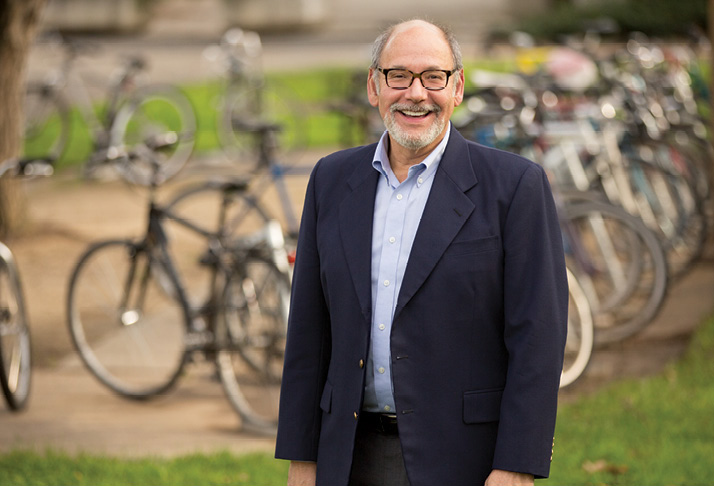
Chatting with Brad Pollock
Chair of the UC Davis Department of Public Health Sciences
Q: Your work has taken you in a variety of fascinating directions. Can you share some highlights?
A: Most of my career has focused on pediatric oncology research. That includes pediatric cancer epidemiology as well as cancer control research. I’ve also spent a lot of time on survivorship research, which is very important for childhood cancer. It’s great that we now cure most kids, but we have to worry about the downstream effects of their treatment. Certain drugs we use to cure leukemia, for instance, can cause heart failure later in life. Radiation for girls with Hodgkin’s disease increases their risk of eventually developing breast cancer. So I’ve done a lot of work to either prevent those late effects of cancer therapy or treat them to reduce the severity.
I’ve also spent a lot of time looking at the etiology of childhood cancers. And while we’ve had many large grants to conduct national studies on this, we really haven’t identified a risk factor that explains any large proportion of childhood cancers. So that’s still an important focus.
Q: What sparked your interest in public health and epidemiology?
A: It was really an accident. I applied to medical school in 1977 but didn’t get in, so I wound up in the epidemiology program at UCLA. I intended to eventually attend med school but found epidemiology exciting. There were some very interesting things happening in public health at the time. In particular, I remember a doctoral seminar taught by Mike Gottlieb, an immunologist on the faculty, about this group of young gay men with Kaposi’s sarcoma. As it turned out, he was documenting HIV and the beginning of the AIDS epidemic. So this medical detective business looked pretty fascinating, and I never left the field.
Q: How does your public health expertise intersect with the mission of the UC Davis Comprehensive Cancer Center?
A: The premise of public health is prevention. So we try to operate on the front end and keep people healthy to reduce their risk of succumbing to cancer. A lot of it focuses on reducing risk by improving people’s lifestyle and diet, encouraging them to exercise, and reducing hazardous exposures.
There’s also the whole area of biostatistics, which is absolutely critical for any kind of research and the design of clinical trials. Cancer informatics is another key piece of the puzzle, and I’ve been part of some of the growing national dialogue on that. This is about trying to structure our clinical data in a way that will both promote good research and improve patient care at the bedside.
I also run a large grant called the NCI Community Oncology Research Program, or NCORP. So in that role I’ll have an active hand in helping to grow our pediatric oncology program and develop more research.
Finally, Ralph (de Vere White, cancer center director) would like to strengthen our focus on cancer etiology, so we will be recruiting cancer epidemiologists with a molecular-genetic focus.
Q: Before coming to UC Davis last year you worked at the University of Texas Health Science Center. What differences have you noticed between the two institutions?
A: A major attraction of UC Davis was the fact that it has an integrated health system. This is a really big deal and often underappreciated. The medical school that I came from in September did not own any hospitals. We had affiliations with several local hospitals, but their administrations were not necessarily perfectly aligned with the medical school, and that presented real challenges.
At UC Davis, it’s all one health system with a single central electronic health record system. That’s important to researchers like me to help us develop intelligent systems for medical decision-making and decision support. This will move us toward the concept introduced by the Institute of Medicine called the Learning Health Care System.
Other great features are the leadership at Davis and the fact that it is such a positive environment. The culture of the place is very collaborative and supportive at all levels. Those are really important attributes for building a research program and being successful.
